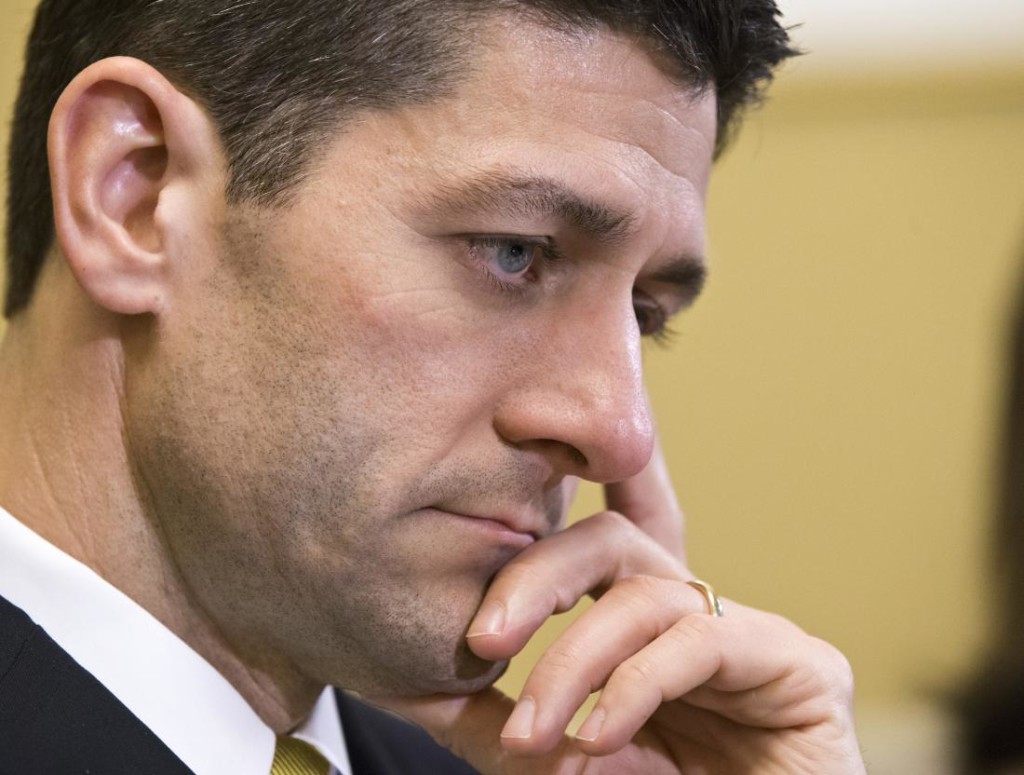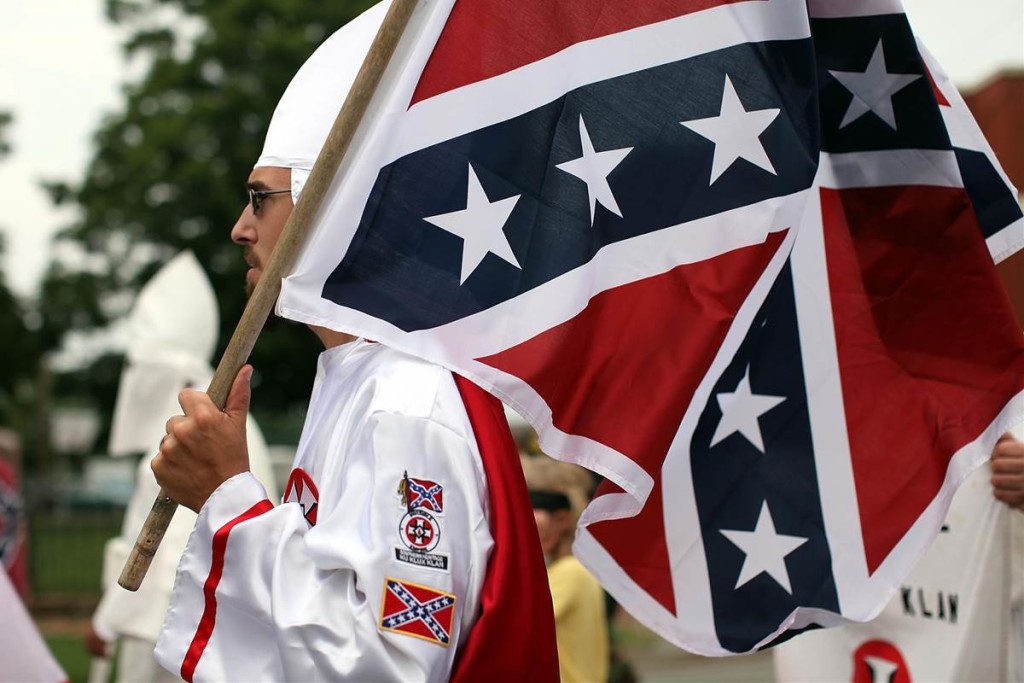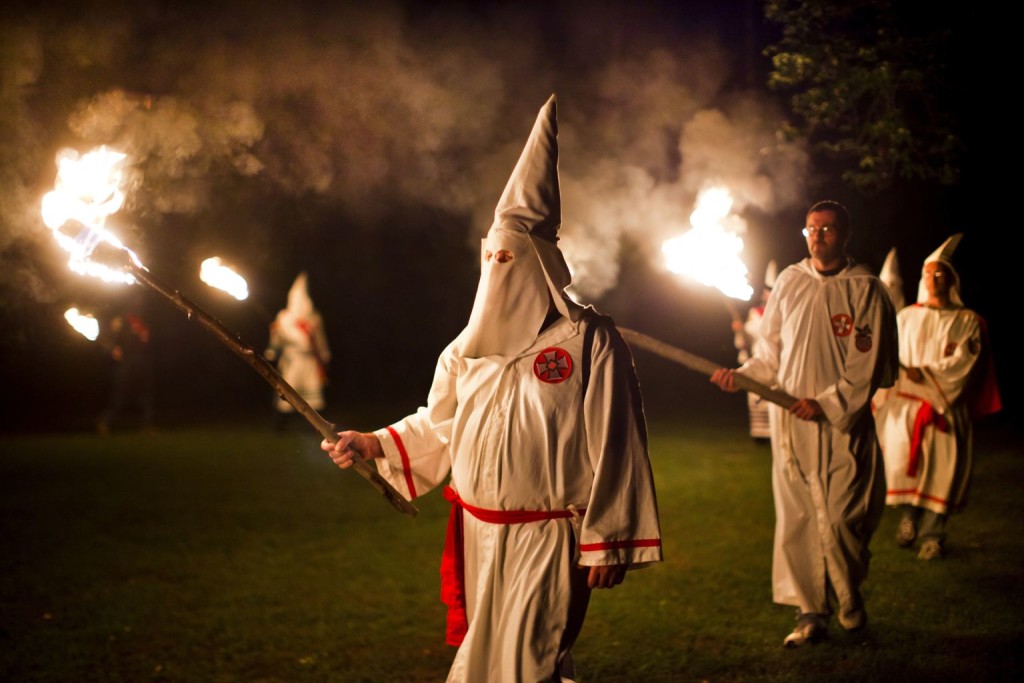Viewer’s Guide: GOP debate about Donald Trump vs. everyone else

And then there were four. Ben Carson‘s departure from the GOP presidential race means the quartet of remaining Republicans on the debate stage Thursday night get more time for attacks as Donald Trump treads a path to the GOP nomination and his three rivals try to trip him up. Cheered on by many Republican leaders, Ted Cruz, Marco Rubio and John Kasich are racing the primary clock to March 15, likely their last chance to stop Trump in a series of winner-take-all contests. Some things to watch Thursday night as the candidates meet at 9 p.m. EST for the Fox News Channel debate in Detroit: HE WHO WAS NOT NAMED Love him or loathe him, Trump has taught the poohbahs of the Republican Party what a power grab really is — and he’s done it by winning over large swaths of the GOP’s own core supporters far from Washington. His wobbling over whether to disavow the support of former Ku Klux Klan leader David Duke finally gave the Republican leaders of Congress a way to go after the billionaire publicly — without uttering Trump’s name. Trump responded by saying House Speaker Paul Ryan would have to get along with a President Trump or pay some sort of “big price.” On the eve of the debate, Ryan’s office confirmed that Trump’s campaign had contacted the speaker’s staff in a first sign of outreach. Notably, Trump has started talking about unifying the GOP. Look for Trump to be asked about the existential rift in the party and how he expects to govern. ___ RUBIO, RUDE? TRUMP, TOO? The Florida senator who once insisted on staying above the scuffling has leapt right into it, emulating Trump’s schoolyard-taunting style. At campaign events in the past week, Rubio made sometimes crude jokes about everything from Trump’s tan to the size of his hands — he even suggested that the billionaire wet his pants at the last debate. Look for whether a newly confident Rubio, emboldened by his first primary win in Minnesota Tuesday, keeps it up or takes a more statesmanlike approach. And what to expect from Trump? “I can’t act overly presidential because I’m going to have people attacking from every side. A very good man, Ben Carson’s not there anymore, so now we’re going to have more time for the fighting,” he said. “When people are hitting you from different angles, from all different angles, unfortunately you have to hit back. I would have a very, very presidential demeanor when I win, but until such time, you have to hit back,” he told NBC on Thursday. ___ CRUZ’S STAND Thanks to Rubio’s win Tuesday, Cruz can no longer say he’s the only Republican who has shown he can beat Trump. But he won three states on Super Tuesday — Alaska, Oklahoma and his home state of Texas. And the delegate math shows that Cruz is emerging as the candidate who might stop Trump. Look for some confidence from Cruz, because on Super Tuesday alone he came close to Trump. For the night, Trump won at least 237 delegates and Cruz won at least 209. Rubio was a distant third with at least 94. Even Sen. Lindsey Graham, who a week earlier joked at a dinner about killing Cruz, acknowledged on CBS that the Texas senator might be the party’s best hope to beat Trump. ___ KASICH, STILL The debate setting is likely most helpful to Ohio Gov. John Kasich, who is looking for a strong showing in Michigan in the state’s March 8 contest, to survive. __ FOX AND TRUMP, FRENEMIES Trump has uttered barely a peep about the fact that Fox News Channel is hosting the debate, and that his sometime-nemesis Megyn Kelly, is one of the moderators. This is a marked change from the upheaval that led to Trump boycotting Fox’s debate just before the leadoff Iowa caucuses. Trump had demanded that Kelly be removed; Fox refused and Trump headed a few miles away to host his own event. He later said that could have been one of the reasons he lost Iowa to Cruz. Trump has not tweeted about Kelly in weeks. In an interview with the Associated Press this week, Kelly said she thinks Trump has more confidence now. “He knows he can handle me. He can handle any interviewer,” she said. ___ TRUMP UNIVERSITY How good is a degree from Trump University? “Worthless” — as are his promises — according to former GOP presidential nominee Mitt Romney. Romney will brand the billionaire businessman as “a phony, a fraud” in a Salt Lake City speech on Thursday, as party of a push by GOP establishment figures to paint the billionaire as unfit to represent the party. Trump should have a few things to say about it. He already started slugging on Thursday morning, saying that Romney “begged” him for his endorsement four years ago, and called him a “failed candidate.” ___ REMEMBER BEN CARSON? Kelly said he wouldn’t have gotten much attention even if he had stuck around for the debate. Fox will concentrate its questions on Trump, Cruz and Marco Rubio — making for potentially awkward moments for Kasich. Republished with permission of the Associated Press.
Paul Ryan: GOP nominee must reject bigotry

House Speaker Paul Ryan said Tuesday anyone who wants to be the Republican presidential nominee must reject any racist group or individual. Ryan made the tacit swipe at GOP front runner Donald Trump as voters in 11 states holding Republican contests headed to the polls on Super Tuesday. Ryan told reporters Tuesday that the GOP is the party of President Abraham Lincoln and “this party does not prey on people’s prejudices.” Ryan was apparently referring to Trump’s appearance Sunday on CNN when he declined to disavow the support of former Ku Klux Klan leader David Duke and other white supremacists. “When I see something that runs counter to who we are as a party and a country I will speak up. So today I want to be very clear about something: If a person wants to be the nominee of the Republican Party there can be no evasion and no games. They must reject any group or cause that is built on bigotry,” Ryan said. Trump subsequently disavowed Duke, blaming his interview performance Sunday on a bad earpiece. Ryan again said he plans to support whomever emerges as the GOP nominee but bemoaned the current discourse in the party and said it was time to get back to focusing on how Republicans would solve the nation’s problems. “We are the party of Lincoln,” Ryan added. “We believe all people are created equal in the eyes of God and our government. This is fundamental. And if someone wants to be our nominee they must understand this.” Ryan was the GOP vice presidential nominee in 2012. He said he has tried to avoid commenting on the presidential race but felt a need to speak up. “I try to stay out of the day-to-day ups and downs of the primary,” Ryan said. “But I’ve said when I see something that runs counter to who we are as a party and a country I will speak up.” Republished with permission of the Associated Press.
KKK distributes fliers in Mobile featuring Martin Luther King Jr.

During the weekend the Loyal White Knights of the Ku Klux Klan, based in Pelham, North Carolina, distributed fliers throughout Mobile, Alabama, referencing Dr. Martin Luther King Jr. The fliers were found by residents, and promptly discarded, only one day before the country celebrated King’s legacy Monday. The fliers, like ones previously distributed across the state, were in plastic bags and found on lawns throughout the city’s Midtown neighborhood. In 2014, fliers were distributed throughout Tallassee and, in 2015, similar flyers were distributed in Selma on the 50th anniversary of Bloody Sunday. According to multiple reports, the fliers contained a “happy birthday” message to King and further said “The blacks have NAACP, the Mexicans have La Raza, the Jews have JDL, and white people have the KKK.” Though a phone call to the group was unsuccessful, the voice mailbox opened with: “Hey whitey, how do you feel about this Martin Luther King Day?” The message went on to disparage King in a variety of ways, using expletives and insulting racist language. It also urged the day be used to celebrate the legacy of Gen. Robert E. Lee. The group’s website calls itself an organization for “White Christian Men & Women Working to Secure A Future, For Pure White Americans” and rejects assertions it’s a hate group. If any of the fliers’ distributors are found, criminal littering charges could be levied, police said.
Alabama KKK actively recruiting to ‘fight the spread of Islam’

Following the terrorist attacks in Paris and San Bernardino, California, residents in Alabama neighborhoods of Cullman and Decatur have reportedly found themselves being recruited by the Ku Klux Klan (KKK) “to fight the spread of Islam in our country.” While the circumstances surrounding the distribution of the alleged KKK recruiting flyers have reportedly are not known, the Alabama chapter of the Council on American-Islamic Relations — America’s largest Muslim civil liberties and advocacy organization — has called on statewide officials to reject growing anti-Islam sentiments, according to a news release. According to the release, similar flyers were reportedly distributed in the same area back in September but without any reference to Islam. “Our state’s leaders must speak out against the rising anti-Muslim bigotry nationwide that is apparently inspiring a new recruiting effort by racists,” said CAIR-Alabama Executive Director Khaula Hadeed. “The KKK must be repudiated, whether it targets African-Americans, Muslims or any other minority group with hatred and intimidation.” The recent flier distribution suggest the KKK’s presence in Alabama is growing, as some 4,000 fliers were left at people’s homes in March as civil rights activists descended on Selma for the 50th anniversary of “Bloody Sunday” in both Selma and Montgomery, historically African American cities. The week that followed, several African American residents in Auburn notified police back in March recruitment fliers attached to rocks were thrown on their driveways. Similar incidents are on the rise nationwide as anti-Muslim sentiment is growing in the wake of the recent terrorist attacks. Joining in the anti-Islamic rhetoric and adding fuel to the fire, Republican presidential candidate Donald Trump stirred global outrage by calling for a “total and complete” ban on Muslims entering the country Monday night. “We have no choice,” Trump said to a standing ovation at a rally in South Carolina, calling the ban “common sense.” Trump continued in a statement, “Without looking at the various polling data, it is obvious to anybody the hatred is beyond comprehension. Where this hatred comes from and why we will have to determine. Until we are able to determine and understand this problem and the dangerous threat it poses, our country cannot be the victims of horrendous attacks by people that believe only in Jihad and have no sense of reason or respect for human life.” Trump’s comments stoked widespread public outrage. “This is exactly what ISIS wants, to turn Americans against one another,” a CAIR representative said. “We stand today united as Americans against stigmatization, against Islamophobia, against ISIS.”
Martin Dyckman: Winner-take-all winner could be Trump

Our next president may well owe the office to arrogant billionaires or be one himself. Meanwhile, The New York Times reports that fewer than 400 families account for nearly half the $388-million already invested in that election still more than a year away. Did America shed blood to be rid of monarchy only to have it come to this? And yet the vast moral and political corruption unleashed by the U.S. Supreme Court’s confusion of free spending with free speech is only one of four ways in which government of the people, for the people and by the people has gone off the track. Voting districts in nearly every state are drawn by the party in power to control the outcomes. The elections themselves are monopolized by two increasingly polarized political parties, excluding the increasing numbers of citizens who want nothing to do with either of them. The elections, whether primary or general, can be won with much less than majorities by unpopular candidates who would not be the second choices of most voters. Florida is powerless to control the money. That will take a constitutional amendment or the election of a president who would insist that his or her Supreme Court nominees agree that the Buckley and Citizens United cases were wrongly decided. Florida has made inroads on the gerrymandering through the adoption of the Fair Districts initiatives five years ago and the state Supreme Court’s willingness to enforce them. But that fortunate condition is imperiled by the next four court appointments, which will be controlled by Rick Scott‘s nominating commission. Time is running very short for people who believe in judicial independence to do something about that. The “All Voters Vote” initiative petitions now circulating would break the shared monopoly of the Republicans and Democrats by allowing everyone to vote in an open primary that could nominate two candidates of the same party — or of no party — for state offices and Congress. That’s good for the growing number of voters who claim no party — presently 27 percent — or who identify with the Greens and other minor parties. To that extent, it would be a significant improvement for everyone. Jim Smith, the former Florida secretary of state and a supporter of the initiative, acknowledges that it hasn’t done much to change the lineup of elected officials in Louisiana and California, the other two open-primary states. He is right, however, in saying that it has “changed the conversation — and it’s a conversation that a broader spectrum of voters want to hear candidates talk about.” Republican candidates in districts with sizable Democratic minorities would have to think twice about toeing the Tea Party line. Democratic candidates in safely blue districts would need to court Republican votes for the first time. But “Top Two” is still vulnerable to the winner-take-all weakness. In 1991, a 12-candidate field in Louisiana’s open primary left voters with a dismal runoff choice: former Gov. Edwin Edwards, whose corruption was flagrant, or David Duke, a former Ku Klux Klan grand wizard and an avowed Nazi. There were bumper stickers saying, “Elect the crook — it’s important,” and so the voters did. Edwards went to federal prison in 2002. That same year, 16 candidates sought the French presidency. Nearly everyone assumed there would be a runoff between a conservative, Jacques Chirac, whose ethics were as suspect as Edwards’, and the prime minister, Socialist Lionel Jospin. Chirac ran first, as expected, with 19.8 percent of the vote. But Jospin was edged out of the running by Jean Marie le Pen of the far right National Front, an ultranationalist party. Although nearly two-thirds of the voters had preferred other candidates, their final options were, as in Louisiana, between two obviously unappealing politicians: a suspected crook and a presumed fascist. (Chirac won.) There’s a way to avoid such dismal outcomes. It’s called ranked-choice voting, a task that computer science makes simple. To see how simple — and have some fun — go to this website: www.fairvote.org. There are links on the page to exercises where you can cast rank-ordered votes for political parties and for the Republican and Democratic presidential candidates. Here’s how the presidential game played out for me and for other participants on Monday. In the Republican poll, Donald Trump led the first round, but with only 18 percent. Bobby Jindal ran last and was eliminated. The second-choice votes of his supporters were distributed. There were 15 more rounds, all conducted instantly by computer. Marco Rubio fell out in the 12th and Jeb Bush in the 13th. In the 16th and last round, Trump finally gave way to Rand Paul, who won the nomination with 51.28 percent support. Bernie Sanders led the Democrats with 46 percent. Hillary Clinton ran third, trailing Joe Biden, who isn’t an announced candidate. Martin O’Malley ran last, with 6 percent, and the second choices of his supporters were counted. Clinton was gone in the fourth round. In the sixth and final, Sanders’s support increased to 51.9 percent and he became the nominee. These results are hardly scientific and not necessarily predictive. The samples were small and self-selected. Anyone could vote in either race, and the biases were obviously liberal. But they’re interesting nonetheless. The two “nominees,” Paul and Sanders, project more authenticity than nearly all the others. As for Trump, he piled up more second-choice votes than everyone except Paul. If the Republican Party of Florida still insists on a March 15 winner-take-all primary, which will be well after many of the trailing and financially poorer candidates have dropped out, Trump could easily win it all. Martin Dyckman is a retired associate editor of the St. Petersburg Times. He lives in Western North Carolina.


